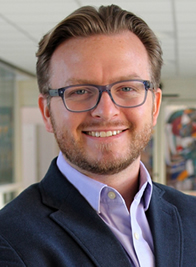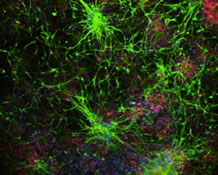Our ability to understand how Alzheimer's disease and other dementia conditions affect the brain and cause debilitating memory loss, confusion, and eventually death, is dependent upon studying brain tissue. Brain donation, also known as brain autopsy, is done after death in a way that does not disfigure the person, or affect funeral arrangements. It is coordinated gently and carefully by healthcare professionals, from the initial planning stages to the call at the time of death. Scott Reid (pictured right) performs these essential functions on behalf of the Taub Institute for Research on Alzheimer’s Disease and the Aging Brain, the Center for Excellence in Alzheimer’s Disease (CEAD), and the Alzheimer’s Disease Research Center (ADRC) at Columbia University Irving Medical Center.
|
|

|
Here, Scott answers some of the most common questions about brain donation.
|
Why donate your brain for autopsy?
Brain donation allows scientists to study brain tissue, to better understand and develop treatments of brain diseases. It also allows the family to receive a brain autopsy report, which provides them with valuable health information about their loved one, including a definitive diagnosis as to what brain condition they had, something that can only be confirmed upon autopsy. The family can provide this autopsy report to doctors to help improve diagnosis, treatment, and support for other family members, should they need it.
What results should families expect to receive in the brain autopsy report?
The brain autopsy report provides a description of any abnormalities present in the brain tissue. Again, it is only through autopsy and the evaluation of the brain tissue under a microscope that the hallmark effects of Alzheimer’s disease (AD)—the presence of amyloid plaques and neurofibrillary tangles—can be confirmed, distinguishing AD from other forms of dementia, such as Lewy Body disease or vascular dementia. Some brain autopsy reports provide unexpected findings, such as a different disease than that diagnosed during life, or the additional presence of other disease processes.
What is the process for voluntary brain donation?
Patients or research participants who are interested in brain donation can start the process by contacting a brain donation coordinator at our center, who will help get them enrolled in the voluntary brain donation program, explain the process, and help them understand what to expect. Immediately upon death, the family contacts the 24-hour phone line provided by the coordinator during the enrollment process. Because the exact issues encountered at time of death cannot necessarily be anticipated ahead of time, it is the coordinator’s job to make the brain donation process as easy and seamless as possible during this initial, difficult period of bereavement. Essentially, the coordinator acts as a liaison between the family, the facility at which the brain autopsy procedure will be performed, the University, and transportation and funeral agents, so that the family can focus on mourning their loved one and attending to final arrangements. Depending on where death occurs, the coordinator will arrange for the transportation of the deceased to the nearest autopsy facility, where the donation procedure itself will take approximately 2 hours.
Once the procedure is complete, the patient’s body will be released for funeral arrangements, and the coordinator may assist with this transition, as well. It is important to note that brain autopsy does not prevent a viewing or any other memorial service, as it is done in a way that leaves little changed in regard to the appearance of the head and body.
What becomes of the brain after autopsy?
The tissue will be retained at Columbia University Irving Medical Center in New York, where it will both be stored for research, and processed for pathology examination. The results of the pathology examination, in combination with the clinical information collected during life, contribute a wealth of knowledge to many on-going research projects. The data collected from autopsied brains at Columbia and nationally help researchers draw larger conclusions related to molecules involved in disease, disease course, and genetic and other risk factors.
Brain tissue is made available for research, by being cataloged and "banked," meaning it is made available for withdrawals by qualified researchers. Scientists who have a need for tissue from autopsy-confirmed cases of AD can request samples from the Columbia "brain bank" to help them explore research questions. Each donation may provide tissue for many different research efforts, both nationally and internationally, through this dispensation of “de-identified” tissue. In this way, the brain donation contributes over years to many investigations and a great deal of research progress.
Are there any restrictions on brain donation (age at donation, disease state, etc.)?
Researchers require tissue from a variety of adult donors ranging in both age and disease severity, as well as healthy controls. Brain donors must first be Columbia patients or participants enrolled in a research study. If you or a family member are interested in becoming a brain donor, please contact your study site coordinator to see if you might be eligible to participate.
Is there any cost to the family?
All costs related to the brain autopsy, tissue analysis, and report are covered for participants who have enrolled in our Columbia studies. Funding may also be available for transportation, facility fees, or other costs related to the donation.
Can donation be initiated shortly after the death of a loved one, or must it be planned ahead of time?
For both the family and the study team, it is most helpful for a donation plan to be completed in advance of death. Creating this donation plan will involve gathering contact information and making tentative arrangements for the eventual donation. However, in the event that the circumstances surrounding death are unanticipated, or a donation plan has not been finalized or updated recently, the coordinator will still provide assistance to attempt to successfully accomplish the donation.
If our loved one is not able to consent, what is the process for the family to donate on their behalf?
Requirements for autopsy consent differ from state to state. In New York State, consent for brain donation is made by persons who are next-of-kin in accordance with local law during the coordination process.
To learn more about our Brain Donation Program, please contact Scott Reid at (212) 305-9086 or smr2212@cumc.columbia.edu.


